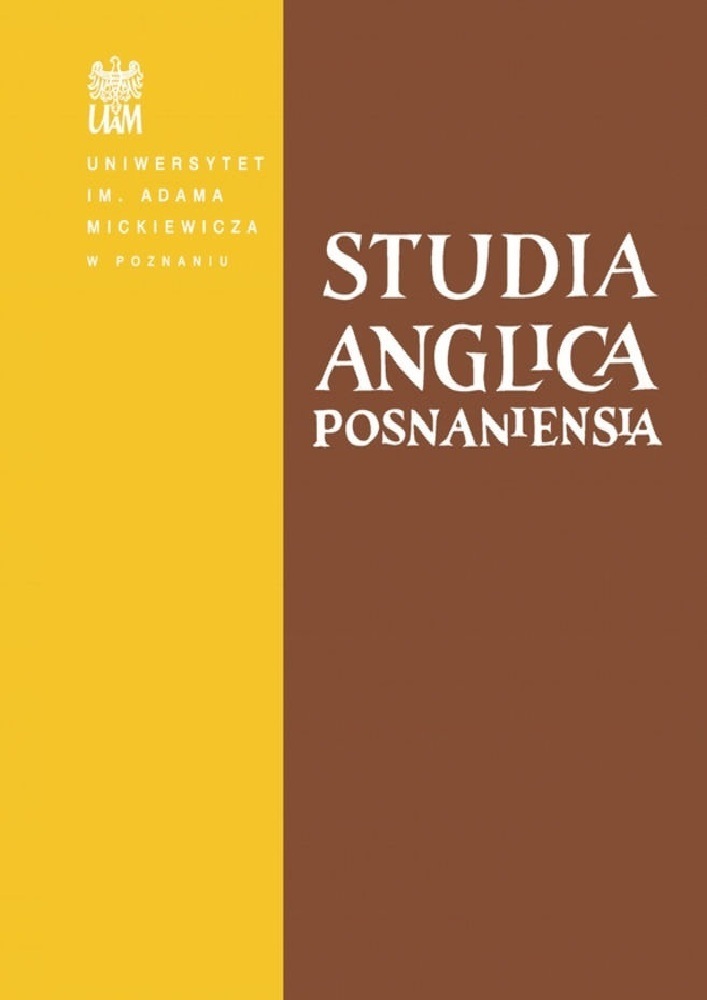Abstract
The most spectacular finding is that John Lydgate regularly uses atwēn, twēn(e) and atwix(t)(en), which are recorded in hardly any other Middle English texts. Moreover, the former two lexemes, and sporadically also atwix(t)(en), produce the highest number of tokens of all lexemes meaning ‘between’ in each analysed Lydgate’s text, which is unique in the whole history of the English language.
References
CMEPV = Corpus of Middle English Prose and Verse: http://quod.lib.umich.edu/c/cme/
Kurath, Hans et al. (eds.). 1952–2001. Middle English Dictionary. Ann Arbor: University of Michigan Press.
LALME = Angus McIntosh, Michael L. Samuels & Michael Benskin, with the assistance of Margaret Laing & Keith Williamson (eds.). 1986. A linguistic atlas of late Mediaeval English. 4 vols. Aberdeen: Aberdeen University Press. See now eLALME (2013–): http://www.lel.ed.ac.uk/ihd/elalme/elalme.html.
McSparran, Frances (ed.). 1999. The Middle English compendium: The Middle English dictionary, a hyperbibliography of Middle English prose and verse, a corpus of Middle English prose and verse. Ann Arbor: Humanities Text Initiative, University of Michigan. Available at http://ets.umdl.umich.edu/m/mec/.
MED = Middle English Dictionary online. Available at http://ets.umdl.umich.edu/m/med/.
OED = James A. H. Murray, Henry Bradley, W. A. Craigie & C. T. Onions (eds.). 1884–1928. Oxford English dictionary. Oxford: Clarendon Press; Robert W. Burchfield (ed.). 1972–1986. Supplement. J. A. Simpson &E. S. C. Weiner (eds.). 1989. 2nd ed. Oxford: Oxford University Press. 2000–. 3rd edition. Available at http://oed.com.
Pintzuk, Susan & Leerndert Plug (eds.). 2001. The York-Helsinki parsed corpus of Old English poetry. Department of Language and Linguistic Science: University of York.
Taylor, Ann, Anthony Warner, Susan Pintzuk & Frank Beths (eds.). 2003. The York – Toronto – Helsinki parsed corpus of Old English prose. Department of Language and Linguistic Science, University of York.
Bergen, Henry (ed.). 1906–1910. Troy Book. 3 vols. (Early English Text Society 97, 103, 106.) London: Oxford University Press.
Bergen, Henry (ed.). 1924–1927. Lydgate’s Fall of Princes. 4 vol. (Early English Text Society 121–124.) London: Oxford University Press.
Furnivall, Frederick J. (ed.). 1886 [1973]. Early English meals and manners. (Early English Text Society 32.) London: Oxford University Press.
Halliwell-Phillipps, James Orchard (ed.). 1840. A selection from the minor poems of Dan John Lydgate. C. Richards for Percy Society.
MacCracken, Henry Noble (ed.). 1911–1934. The minor poems of John Lydgate. 2 vols. (Early English Text Society OS 107; 192.) London: Oxford University Press.
Steele, Robert (ed.). 1894. Lydgate and Burgh’s Secretes of old philisoffres: A version of the Secreta secretorum. London: Kegan Paul, Trench, Trübner & Co. for Early English Text Society.
Alcorn, Rhona. 2013. Distribution of variants of Old English by, for, between. Transactions of the Philological Society. 112.1. 1–17.
Ciszek-Kiliszewska, Ewa. 2014a. The preposition yēond in Layamon’s Brut. In Michael Bilynsky (ed.), Studies in Middle English: Words, structures, senses and texts, 135–150. Frankfurt/Main: Peter Lang.
Ciszek-Kiliszewska, Ewa. 2014b. Middle English preposition twēn(e). Studia Anglica Posnaniensia 49.3. 91–111.
Ciszek-Kiliszewska, Ewa. 2014c. Middle English preposition and adverb emell(e). Kwartalnik Neofilologiczny 61.3. 587–599.
Ciszek-Kiliszewska, Ewa. 2014d. Middle English preposition and adverb twix. Token: A Journal of English Linguistics 2. 75–91.
Ciszek-Kiliszewska, Ewa. 2015. The Middle English preposition and adverb atwēn. In Brian Lowrey & Fabienne Toupin (eds.), Studies in linguistic variation and change: From Old to Middle English, 41–63. Cambridge: Cambridge Scholars Publishing.
Esteban-Segura, Laura. 2014. A diachronic study of the prepositions among and amongst. Token: A Journal of English Linguistics 2. 93–107.
Hopper, Paul & Elizabeth Closs Traugott. 1993. Grammaticalization. (2nd edn.) Cambridge: Cambridge University Press.
Hotta, Ryuichi. 2014. Betwixt and between: The ebb and flow of their historical variants. Journal of the Faculty of Letters: Language, Literature and Culture 114. 17–36.
Iglesias-Rábade, Luis. 2011. Semantic erosion of Middle English prepositions. Frankfurt/Main: Peter Lang.
Krygier, Marcin. 2011. On the Scandinavian origin of the Old English preposition til ‘till’. In Jacek Fisiak & Magdalena Bator (eds.), Foreign influences on Medieval English, 129–138. Frankfurt/Main: Peter Lang.
Kytö, Merja. 1996. Manual to the diachronic part of the Helsinki Corpus of English Texts: Coding conventions and lists of source texts. Helsinki, Department of English University of Helsinki.
Molencki, Rafał. 2005. On the syntactic and semantic development of after in medieval English. In Marcin Krygier & Liliana Sikorska (eds.), Naked wordes in Englissh, 47–67. Frankfurt/Main: Peter Lang.
Molencki, Rafał. 2007a. On the rise of the temporal preposition/conjunction before. In Marcin Krygier & Liliana Sikorska (eds.), To make his Englissh sweete upon his tonge, 37–54. Frankfurt/Main: Peter Lang.
Molencki, Rafał. 2007b. Rozwój diachroniczny before i after w języku angielskim. In Andrzej Łyda (ed.), Przestrzenie języka, 10–24. Katowice: Wyższa Szkoła Zarządzania Marketingowego i Języków Obcych.
Molencki, Rafał. 2008. The rise of because in Middle English. In Masachiyo Amano, Michiko Ogura & Masayuki Ohkado (eds.), Historical Englishes in varieties of texts and contexts, 201–216. Frankfurt/Main: Peter Lang.
Molencki, Rafał. 2011a. New prepositions and subordinating conjunctions of Romance origin in Middle English. In Jacek Fisiak & Magdalena Bator (eds.), Foreign influences on Medieval English, 9–24. Frankfurt/Main: Peter Lang.
Molencki, Rafał. 2011b. The evolution of forward in Mediaeval English. In Renate Bauer & Ulrike Krischke (eds.), More than words. English lexicography past and present, 225–244. Frankfurt/Main: Peter Lang.
Traugott, Elizabeth Closs. 1989. On the rise of epistemic meanings in English: An example of subjectification in semantic change. Language 65.1. 31–55.
Traugott, Elizabeth Closs. 1995. Subjectification in grammaticalization. In Dieter Stein & Susan Wright (eds.), Subjectivity and subjectivisation: Linguistic perspectives, 31–54. Cambridge: Cambridge University Press.
